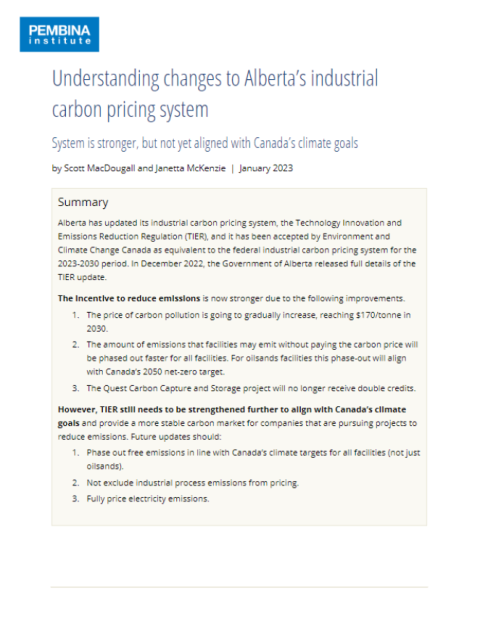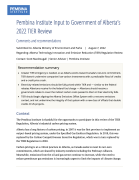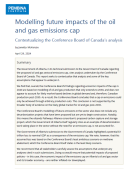The federal and provincial governments recently concluded negotiations on strengthening and updating carbon pricing systems across the country.
Industrial carbon pricing is the backbone of Canada’s emission reductions policy framework. When these systems are stringent and robust, they play a key role in incentivizing investment in emissions reduction projects. That investment will be crucial to meeting our climate targets, while also futureproofing our heavy industries to compete in the low-carbon global economy of the near future.
In December 2022, the Government of Alberta provided details about the updates to its Technology Innovation and Emissions Reduction (TIER) regulation. The Pembina Institute participated in the review of TIER last year.
Having reviewed those details, we are pleased to see some updates to TIER that will strengthen the signal for companies to invest in emissions reductions, with the following measures:
- The price of carbon pollution is going to gradually increase, reaching $170/tonne in 2030.
- The amount of emissions that facilities may emit without paying the carbon price will be phased out faster for all facilities. For oilsands facilities this phase-out will align with Canada’s 2050 net-zero target.
- The Quest Carbon Capture and Storage project will no longer receive double credits.
However, further strengthening is needed to fully align TIER with Canada’s climate goals. In addition, given current public discussions around the level of government funding support for carbon capture, utilization and storage (CCUS) projects, we are interested to see a new class of credits created specifically for CCUS.
Overall, our analysis is that these updates to TIER – along with considerable federal policy incentives (the 50% Investment Tax Credit, Clean Fuel Regulation, Oil and Gas Emissions Cap, and forthcoming Carbon Contracts for Difference) – provide sufficient upfront and sustained support for companies in Alberta to now make progress on CCUS projects. Our assessment is that no further support, either from the federal or provincial government (such as changes to Alberta’s Oil Sands Royalty system), is needed to support these crucial decarbonization projects.
This briefing note provides further details on the Pembina Institute's analysis of this TIER update, and provides recommendations for future further strengthening of TIER.








